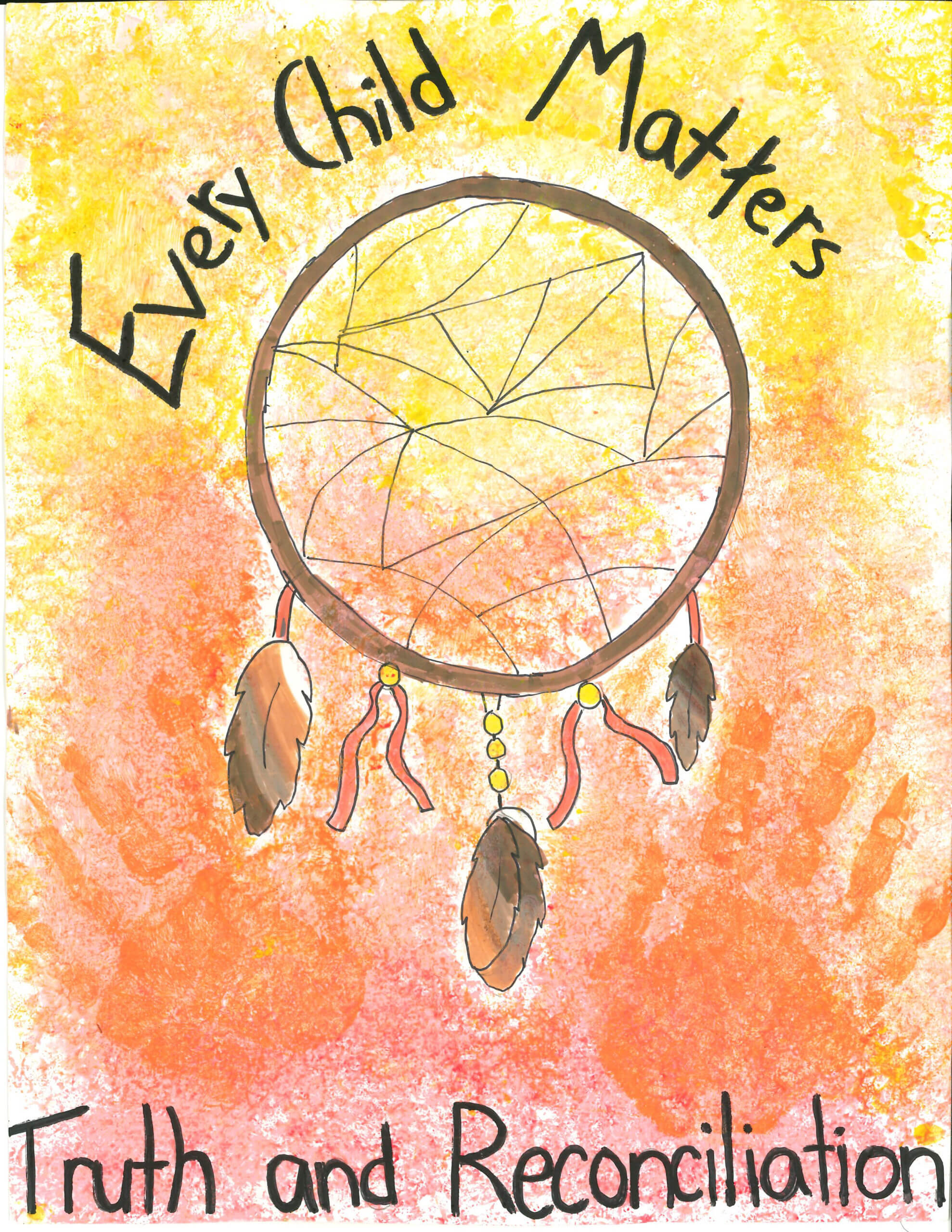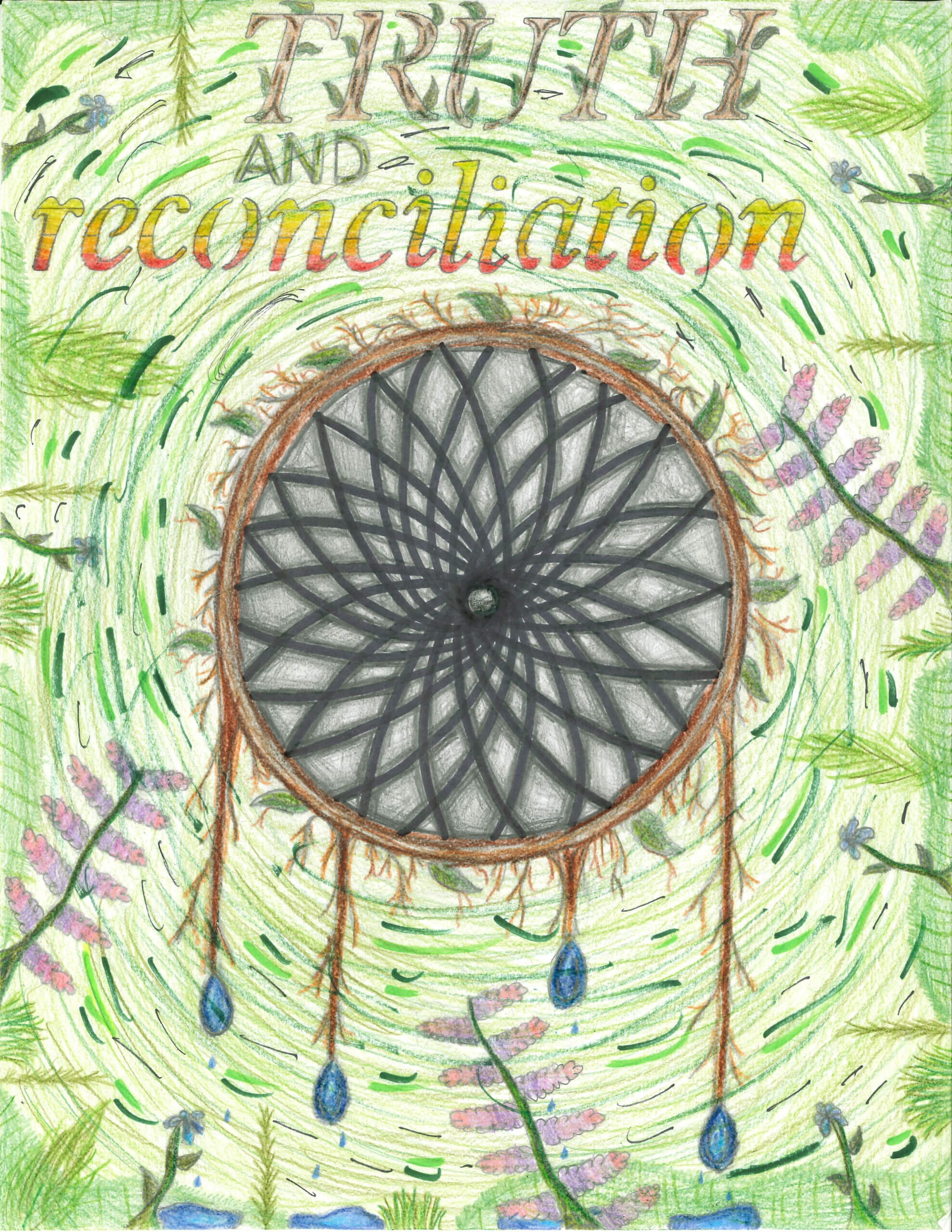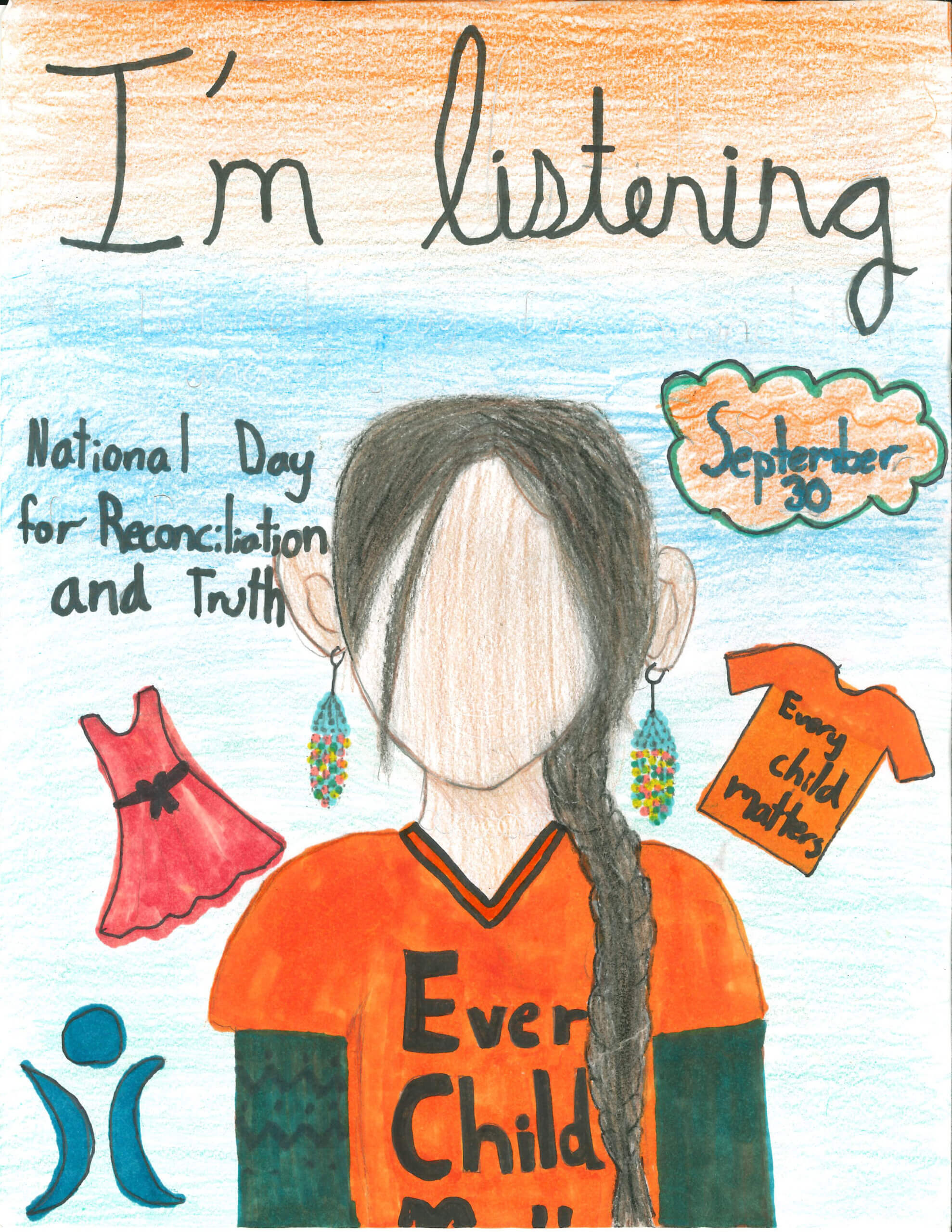Residents living throughout much of Manitoba, excluding the Northern Health Region, are advised that community health services – particularly home care services – and some clinic appointments could be significantly disrupted next week if planned job action by CUPE and MGEU-affiliated staff proceeds. Click here for more information.
Poster contest winners reflect on reconciliation
Young local artists are being recognized for their heartfelt designs in honour of the National Day for Truth and Reconciliation on Sept. 30.
Youth aged 12 to 18 entered a contest launched by Interlake-Eastern Regional Health Authority to design a poster for this important national recognition day, which honours survivors of residential schools and children who never returned home.
Health authority staff and select community partners reviewed 25 submissions from across the region and selected three winning entries.
The winning submissions were created by Vanya from Stonewall, Nicholas from Garson and artistic duo Hunter and Evan from Stonewall. Their designs will be featured on posters that will be on display in Interlake-Eastern Regional Health Authority facilities across the region.
Vanya’s poster depicts an image of girl in an orange shirt without any facial features.
“I drew this girl without a face because in residential school, lots of identities were lost,” Vanya wrote in her artist’s statement.
The artwork by Nicholas shows a dreamcatcher with handprints in the background.
“I put the handprints and orange on the poster to remember the children that went to residential schools,” Nicholas said. “The dreamcatcher is for Indigenous people. I also wanted to remember the survivors in my own family.”
Evan and Hunter worked together to create a poster that depicts a dreamcatcher on a background of green leaves and purple flowers.
“The poster has a dreamcatcher and nature, which are both significant to the Indigenous culture,” they shared in explanation of their design.
Each winning submission received $100. Members of the public will be able to see this artwork posted in IERHA facilities at the end of September.



Manitobans asked to help select design for province’s new health card
Visit https://engagemb.ca/health-cards to vote for your preferred design. Act soon as the poll closes Sunday, Sept. 29.
More than 100 University of Manitoba physicians attend family medicine resident retreat in Gimli
Interlake-Eastern Regional Health Authority (RHA) hosted the 2024 Family Medicine Resident Retreat in Gimli September 20 to 22 to showcase the region’s many practice and lifestyle opportunities.
In total, 110 first- and second-year family medicine physician residents attended the event planed by their colleagues to participate in education presentations, explore the area with their families and rekindle relationships with their classmates.
“The weekend would not be a success without the help of our local communities who understand the value of investing in this retreat to help with physician recruitment in our rural communities. Thank you for your sponsorship,” says Interlake-Eastern RHA chief medical officer Dr. Charles Penner. “A special thank you to the individuals who represented their communities, who handed out the welcome baskets and who extended a warm welcome to these young doctors to start their weekend off right.”
The weekend included a variety of tourist, social and educational events with a focus on rural practice and rural living. Among educational sessions offered were family practice, physician wellness, suturing, rural emergency medicine and Indigenous health. A special thank you to physicians practicing in Interlake-Eastern RHA who took time to speak to residents and attend the job fair. Hosting the resident retreat rotates among rural regional health authorities. The last time Interlake-Eastern RHA hosted the was in September 2019. As a result of the overwhelmingly warm welcome young physicians receive from communities as well as physicians practising in the health region who offer training opportunities combined with the work of the RHA, 14 former University of Manitoba family medicine residents have started practising in the region. That’s more than the region has been able to attract in the past. These doctors could have started their practices anywhere in Canada or abroad but they chose Interlake-Eastern RHA.
Thank you to the following communities who supported the event:
- Lake Manitoba First Nation
- Local Government District of Pinawa
- Rural Municipality of Alexander
- Rural Municipality of Arborg
- Rural Municipality of Coldwell
- Rural Municipality of Fisher
- Rural Municipality of Gimli
- Rural Municipality of Reynolds
- Rural Municipality of Rosser
- Rural Municipality of St. Clements
- Rural Municipality of St. Laurent
- Rural Municipality of Springfield
- Rural Municipality of West Interlake
- Rural Municipality of Whitemouth
- Town of Arborg
- Town of Lac du Bonnet
- Town of Powerview-Pine Falls
- Town of Stonewall
- Town of Teulon
- Town of Winnipeg Beach
New inpatient unit expansion opens at Selkirk Regional Health Centre
Eighteen inpatient beds are now open at Selkirk Regional Health Centre’s new inpatient unit with 12 more beds to open by November. Interlake-Eastern Regional Health Authority (IERHA) staff, community members and construction partners joined to celebrate the formal opening of the 30 bed inpatient expansion on September 13.
“After years of cuts, our government understood adding beds and staff to the health care system was the first priority. These beds will free up space in Selkirk’s wards and reduce access blocks in the emergency department, which will in turn reduce wait times for families,” said Minister of Health, Seniors and Long Term Care Uzoma Asagwara. “Funding a bed is only part of the solution, we have to staff it as well. I want to thank the front line workers and IERHA staff who helped us open this new unit and welcome the patients.”
IERHA CEO Marion Ellis acknowledged the people who worked to bring this project to fruition.
“Completed ahead of schedule, this inpatient expansion project is a credit to everyone involved from planning through to completion,” said Ellis. “Expansion of Selkirk Regional Health Centre will help us better meet the needs of residents across the health region and health system.”
Ellis acknowledged Interlake Eastern Health Foundation and Selkirk gift shop volunteers for their ongoing contributions to supporting patient care.
“It’s our collective privilege to be in a position to offer care to people when it’s needed. We remain grateful for the community support that we receive,” Ellis said.
In addition to the 28,627 square foot inpatient expansion, the project also included enlargement of the health centre’s emergency department waiting room.
BACKGROUND
Selkirk Regional Health Centre Inpatient Unit Addition
The new 30 bed inpatient unit and emergency department expansion are improving Interlake-Eastern RHA’s ability to care for patients across the region and health system.
Inpatient Addition
- 28,627 sq. ft. single storey addition
- Two new wings (medicine 3 and 4) comprising 30 new inpatient rooms in total
- private rooms with washrooms
- two bariatric isolation rooms
- therapy tub room
- central care stations with satellite workstations for staff
- increased support services and physician space
- Medicine 3 opened September 3
- Medicine 4 scheduled to open in November
Emergency department waiting room expansion
- Two new treatment rooms and one new treatment station have been created
- Waiting room has been expanded
Mental Wellbeing
Mental Wellbeing
Practical Relaxation Series:
Sign up for one or more sessions! Each session is about one hour.
Explore simple relaxation techniques and get started on managing stress and improving your health and overall well-being today!
- INTRO TO STRESS – This hands-on session reviews causes of stress, relaxation response, and ways to manage stress. Focus: Deep breathing & guided imagery.
- INTRO TO MINDFULNESS – This session introduces mindfulness, which helps reduce stress by focusing awareness on the present moment.
- INTRO TO REFRAMING OUR THOUGHTS – Our thoughts can influence our feelings and actions. Improve your mood by thinking in a flexible and more balanced way!
- PRACTICING GRATITUDE – Practicing an “attitude of gratitude” can have health benefits such as less anxiety, better sleep and more happiness! Learn how to get started with as little as 5 minutes a day!
Manitoba Government Announces Universal Birth Control Coverage Starting Oct. 1
Manitobans will see cost savings with the introduction of no-cost coverage of prescription birth control, beginning Tuesday, Oct. 1, Health, Seniors and Long-Term Care Minister Uzoma Asagwara announced today.
Check-in with vulnerable or isolated community members recommended in hot temperatures
Hot weather has arrived in Manitoba. Individuals who are elderly, living alone or with compromised health will benefit from a regular check-in during times of high heat.
All Manitobans can take care to prevent heat illness by:
- drinking plenty of liquids, especially water, before feeling thirsty;
- avoiding prolonged sun exposure;
- cancelling outdoor activities or rescheduling them to cooler times of the day;
- taking more breaks and staying well hydrated if working outdoors;
- wearing loose-fitting, light-coloured clothing and a wide-brimmed hat;
- limiting alcohol consumption;
- blocking sun out at home during the day by closing awnings, curtains or blinds;
- taking a cool shower or bath; or
- going to a cool place such as a mall, community centre, public library or place of worship.
Health Care Services Available this Summer
Enjoy the outdoors safely this summer:
Water safety
Always wear a life jacket when boating. Some beaches have life jacket loaner stations and three provincial parks: Birds Hill, Grand Beach (West Beach) and Winnipeg Beach have beach safety officers. Read more: Province of Manitoba | News Releases | Manitoba Government Supports Beach Safety Officers, Encourages Manitobans to Stay Safe This Summer
Heat and Your Health
During hot weather, be sure to monitor yourself and others for heat related illness: Heat and Your Health | Health | Province of Manitoba (gov.mb.ca)
Know where to go when injury or illness hits:
Emergency Care
In the event of emergency, always call 911.
Looking for emergency department near you? Check the schedules:
Clinics are open extended hours
QuickCare Clinic in Selkirk
Located at:
Selkirk Crossing
Across from Boston Pizza
#3-1020 Manitoba Avenue
The Selkirk QuickCare Clinic provides same day services by appointment. You can call for an appointment starting at 9:30 am. To book your same day appointment, call 204-482-4399.
Hours: Open everyday including weekends.*
More information: QuickCare Clinic (ierha.ca)
Winnipeg Beach Primary Care Clinic
Located at: 54-60 Main St, Unit J, Winnipeg Beach
Hours: Monday – Friday 9:00am – 4:00pm*
(closed for lunch, Noon – 1:00pm)
9:30am – 4:30pm, weekends and holidays (closed for lunch, Noon – 1:00pm)*
Phone: 204-389-3649 to make an appointment.
Grand Marais Primary Health Care Clinic
Located at: Grand Marais Community Central & RV Park (36058, PTH 12)
EXTENDED HOURS:
9:00am to 4:00pm on weekends and holidays. Walk-ins welcome during extended hours. On weekends and holidays only call 204-754-8372 (phones not monitored on weekdays)*
Ashern Lakeshore General Hospital now accepting Indigenous Artist Proposals for Mural
The construction of the new state of the art Ashern Lakeshore General Hospital 26 private room inpatient unit expansion is on track for targeted completion at the end of the year with the first patients seen in the new wing sometime in February 2025.
As part of this expansion project, a new room for patients and visitors to gather called “All Are Relations” is being added. This room has a wall for a mural that will provide a welcoming environment for patients and their families.
“One of the ways people can feel at ease in health care facilities is through surroundings that represent who they are,” says Interlake-Eastern Regional Health Authority Indigenous health lead Adam Sanderson. “It is hoped that the feature wall at Ashern’s Lakeshore General Hospital will reflect local communities, the place of spirituality in the healing journey and be inclusive in its presentation.”
The artwork would need to be approximately 7’ high by 18’ wide and should reflect one or more of the following themes:
- Health, Healing and Wellness
- Nature
- Indigenous culture/history
- Local culture/history of surrounding communities
- Truth and Reconciliation
Interested indigenous artists who would like to be considered to commission the mural are invited to submit an application at https://www.ierha.ca/about-us/community-involvement/indigenous-health/truth-and-reconciliation-day/ashern-lakeshore-general-hospital-indigenous-mural-submission/
Deadline for applications is August 30, 2024.
Internationally Educated Nurses
Internationally Educated Nurses
If you are currently located in Manitoba:
Are you an international educated nurse seeking information on opportunities in Manitoba? The Manitoba government supports internationally educated nurses (IENs) with a streamlined pathway and financial support to help IENs who are already in Manitoba begin working as nurses in the province sooner. Learn more about International Educated Nurses
Register with the Manitoba Internationally Educated Nurses (IENs) Program
When you enroll in the Manitoba Internationally Educated Nurses (IENs) Program, you access a team of people who will create a plan with you to support you through all stages of becoming a nurse in Manitoba. Manitoba Internationally Educated Nurses (IENs) Program Intake Form | Manitoba Health | Province of Manitoba
Expedited Licensure Process for Designated Countries
CRNM has developed an expedited licensure process for eligible applicants from the following countries:
- the United States;
- the United Kingdom;
- Ireland;
- Australia; and
- New Zealand
Expedited Registration Pathway
CRNM has developed an expedited licensure process for eligible applicants. Click the link below to find out more:
Q & As
Answers to commonly asked questions about the process can be found below:
Eligibility
To be eligible, applicants must meet the following criteria:
- Graduated from an approved RN program from the United States, the United Kingdom, Ireland, Australia or New Zealand that led to their initial RN registration;
- Exceptions: an “Associate Nursing Degree” (US) without sufficient educational upgrading to a BN/BSN credential or any specialized nursing degree (e.g. psychiatry/mental health, pediatrics, midwifery, etc.) are not eligible for the expedited pathway. Graduated from that program within the last 2 years OR practiced a minimum of 450 hours in the last two years or 1125 in the last five years in one of the designated countries; and
- Holds current and active registration in good standing in a designated country.
Process
- Apply to NNAS (advisory report issued within five days of completed application)
- Apply to the College – The College will review the application to verify that all eligibility criteria are met
- Complete the “Registered Nurse Practice” course at RRCP (NRSG-1012) – This course may be completed up to one year prior to applying to the College and must be completed prior to engaging in transitional practice experience.
- Pass the national entry to practice exam (NCLEX-RN) – Not applicable to individuals who have already passed this exam.
- Complete transitional Practice Experience (250 supervised practice hours) – Applicants will be granted a conditional RN registration, with no limit on scope of practice. Practice hours must be completed within one year and with a designated employer (includes public employers such as: a health authority, Shared Health, Indigenous Services Canada, Cancer Care, corrections).
- Full RN registration
- All steps in this pathway, except supervised practice can be done prior to moving to Manitoba
Questions should be directed to:
Take caution during tick season
Reduce your risk of tick bites and disease exposure by:
- applying an appropriate tick repellent on exposed skin and clothing, following label directions;
- wearing long pants and long-sleeved shirts;
- tucking in clothing to create a barrier;
- staying to the centre of walking trails;
- inspecting yourself, children and pets after spending time outdoors;
- removing ticks as soon as possible from people and pets, using tweezers; and
- keeping grass and shrubs around homes cut short to create drier environments that are less suitable for tick survival.
24-hour crisis line going temporarily out of service tomorrow at 1:00 p.m.
The 24-hour crisis line (204-482-5419 and 1-866-427-8628) will be out of service (for a short period up to 30 minutes) at 1 p.m. on Wednesday, May 29 while MTS moves the 24 hour crisis line phones to their new location. Users will hear a dial tone, busy signal, or “phone not in service.” This is a result of the move of mental health services from 446 Main St. location to the second floor of the Selkirk Community Health Office at 237 Manitoba Ave, in Selkirk. If you need to access a crisis line during this time, please contact Klinic’s 24-hour crisis line at 1-888-322-3019. We apologize for the inconvenience.
Pride Week 2024
June is here, and it’s time to celebrate love, acceptance, and the beautiful diversity of the 2SLGBTQQIA+ community. The acronym 2SLGBTQQIA+ represents those who are two-spirit, lesbian, gay, bisexual, transgender, queer, questioning, intersex, asexual, and all other sexual orientations and genders.
These terms and acronyms may be used differently by individuals in various ways depending on how they identify and the context. People will also have different understandings of their identity and it is up to individuals to decide what their identity means to them. If you are unsure of how someone identifies, asking which pronouns they use is respectful and good practice.
Pride Month is not just a time for parades and parties—it’s a powerful reminder of the ongoing fight for equality and recognition.
Want to learn how you can support diversity and inclusivity?
Check out these resources from Shared Health:
Becoming an Ally – HM (sharedhealthmb.ca)
Pronouns, 2SLGBTQQIA+ & Health Care Leading Practice Guide
Genderdiversity poster (8.5 × 11 in) (sharedhealthmb.ca)
Paramedic Services Week 2024
May 19-25 is Paramedic Services Week. IERHA acknowledges the paramedics and their team members who are providing life-saving care during medical emergencies every day in our region. Thank you for your service!
On May 15, the Manitoba government proclaimed May 19-25 Paramedic Services Week
Read more about this week on sharedhealthmb.ca






